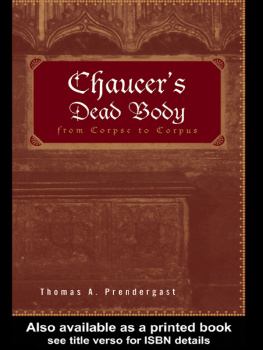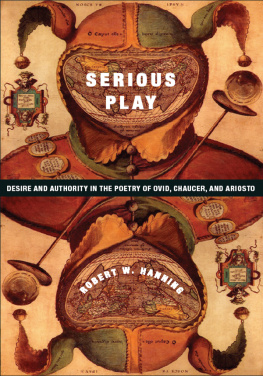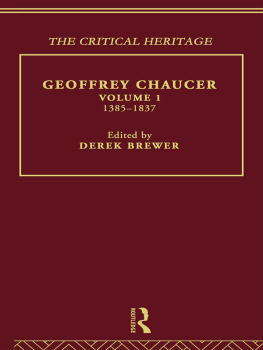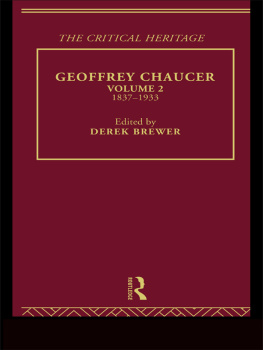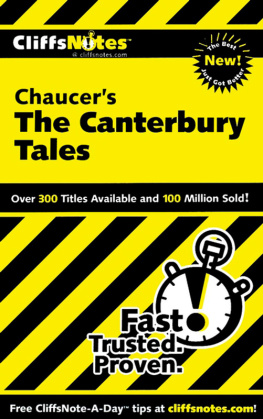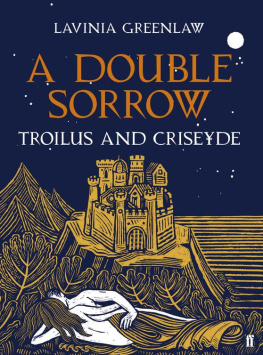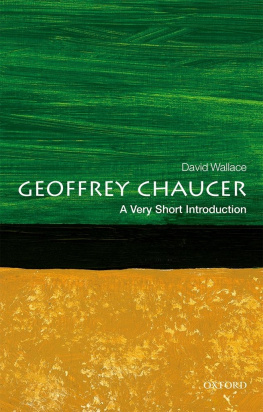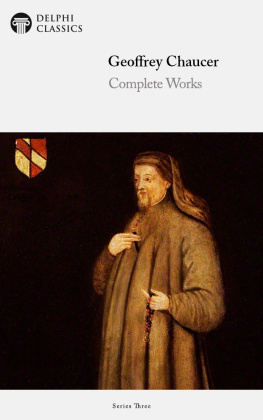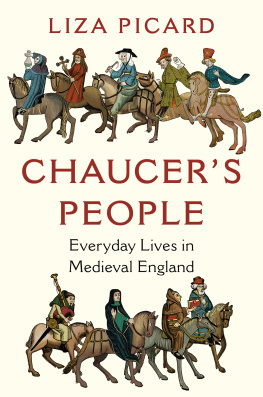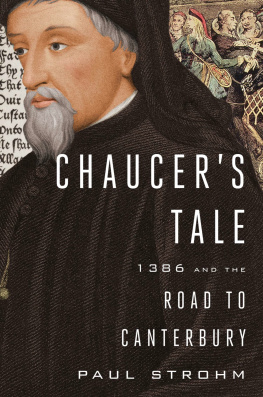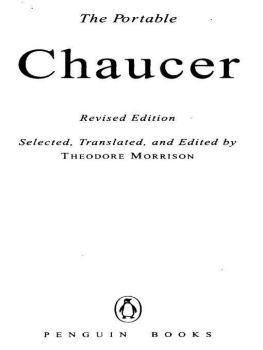Chaucer Geoffrey - Chaucers dead body: from corpse to corpus
Here you can read online Chaucer Geoffrey - Chaucers dead body: from corpse to corpus full text of the book (entire story) in english for free. Download pdf and epub, get meaning, cover and reviews about this ebook. City: New York;Great Britain, year: 2011;2004, publisher: Routledge, genre: Science. Description of the work, (preface) as well as reviews are available. Best literature library LitArk.com created for fans of good reading and offers a wide selection of genres:
Romance novel
Science fiction
Adventure
Detective
Science
History
Home and family
Prose
Art
Politics
Computer
Non-fiction
Religion
Business
Children
Humor
Choose a favorite category and find really read worthwhile books. Enjoy immersion in the world of imagination, feel the emotions of the characters or learn something new for yourself, make an fascinating discovery.
- Book:Chaucers dead body: from corpse to corpus
- Author:
- Publisher:Routledge
- Genre:
- Year:2011;2004
- City:New York;Great Britain
- Rating:4 / 5
- Favourites:Add to favourites
- Your mark:
- 80
- 1
- 2
- 3
- 4
- 5
Chaucers dead body: from corpse to corpus: summary, description and annotation
We offer to read an annotation, description, summary or preface (depends on what the author of the book "Chaucers dead body: from corpse to corpus" wrote himself). If you haven't found the necessary information about the book — write in the comments, we will try to find it.
Chaucers dead body: from corpse to corpus — read online for free the complete book (whole text) full work
Below is the text of the book, divided by pages. System saving the place of the last page read, allows you to conveniently read the book "Chaucers dead body: from corpse to corpus" online for free, without having to search again every time where you left off. Put a bookmark, and you can go to the page where you finished reading at any time.
Font size:
Interval:
Bookmark:

ROUTLEDGE
NEW YORK AND LONDON
Published in 2004 by
Routledge
29 West 35th Street
New York, NY 10001
Published in Great Britain by
Routledge
11 New Fetter Lane
London EC4P 4EE
Copyright 2004 by Taylor & Francis Books, Inc.
Routledge is an imprint of the Taylor & Francis Group.
This edition published in the Taylor & Francis e-Library, 2005.
To purchase your own copy of this or any of Taylor & Francis or Routledges collection of thousands of eBooks please go to www.eBookstore.tandf.co.uk.
All rights reserved. No part of this book may be reprinted or reproduced or utilized in any form or by any electronic, mechanical or other means, now known or hereafter invented, including photocopying and recording or in any information storage or retrieval system, without permission in writing from the publisher.
Library of Congress Cataloguing-in-Publication Data Prendergast, Thomas A. (Thomas Augustine) Chaucers dead body: from corpse to corpus/by Thomas A.
Prendergast.
p. cm.
Includes bibliographical references (p.) and index.
ISBN 0-415-96678-7 (hardback: alk. paper)ISBN 0-415-96679-5 (pbk.
: alk. paper)
1. Chaucer, Geoffrey, d. 1400Criticism and interpretationHistory. 2. Chaucer, Geoffrey, d. 1400AppreciationGreat Britain. 3. Literature, MedievalHistory and criticismTheory, etc. 4. Chaucer, Geoffrey, d. 1400Death and burial. 5. Authors and readersGreat BritainHistory. 6. Chaucer, Geoffrey, d. 1400Tomb. 7. CriticismGreat BritainHistory. 8. Middle Ages in literature. 9. Canon (Literature) I. Title.
PR1924.P74 2003
821'.1dc21
2003007754
ISBN 0-203-49577-2 Master e-book ISBN
ISBN 0-203-57862-7 (Adobe eReader Format)
This book has been a long time coming. Indeed, Charles has had to share his father with the dead for his whole life. He would join me, I think, in thanking all of the people who helped bring this project to completion.
Chaucers Dead Body might still not have a home without Russ Castronovos insight, material support and encouragement. Tom Goodmans, Vance Smiths, and Stephanie Triggs insightful comments on the manuscript transformed it into a much better book. Mike Mays came up with the title after a particularly exhausting day at the Payne Center. Scott Juengel helped me theorize the peculiar place of anthropometry in the Chaucer story. Tony Trowles, Christine Reynolds, and Richard Mortimer made working at the Westminster Abbey Library an enjoyable and productive experience. Steve Arch, Jonathan Barron, Leslie Bow, John Ernest, Michael Salda, Ellen Weinauer and my colleagues at the College of Wooster all provided an environment that not only sustained the project but pushed me to see it to the end. I would like to thank the College of Wooster for the leave that enabled me to finish the penultimate draft of this book. Finally, I would like to thank Terryintellectual partner, fellow pilgrim, beloved. It is to her that I dedicate this book.
The Flesh, like the repressed, will not long allow itself to remain insilence.
Thomas Laqueur
This project began with a question that I was never able to answer. While searching through Caroline Spurgeons Chaucer Criticism and Allusion for early modern references to Chaucers Complaint to His Purse, I noticed that, at least three times between 1566 and 1577, debtors were ordered to tender money at the tombe of Jeffrey Chawcer. Haselwood had admitted that he had not looked very hard for an answer, so I thought that a bit of work would unearth, if not the rationale for the connection between money and burial place, then an acknowledgement of the practice that might explain why Chaucers tomb was linked with fiscal obligation.
Above all I hoped that a bit of research might turn up historical connections between the location of the body of the poet and the transcendent body of money, connections which would advance some interesting theoretical paradigms about corporeal death, poetic life, and exchange value. In other words (to invert Paul Strohms argument about counterfeiting), I thought that the ineffable aura of the deceased might have been seen to legitimate, vitalize, or sacralize the locus at which an exchange of hitherto dead metal was carried out.
More promising was the meaning of the word itself. Literally, of course, to translate means to carry across to pass over, in other words, some threshold. But far from offering any closure to the question of money and the tomb, these connections seemed to suggest that questions of reputation, value, and authenticity (was the body actually translated?) were ultimately wrapped up in the larger idea of the auratic qualities of Chaucers corpse.
Nowhere did the sacral qualities of the body of the poet become more clear than in the nineteenth century. As I looked to see if anyone had responded to Haselwoods query about the connection of tomb and money (no one had), I discovered that Haselwoods interest marked the beginning of a larger cultural phenomenon of corporeal concern in the nineteenth century. In the same year that Haselwood had published his question in the Gentlemans Magazine (1823), Edward Brayley published a detailed description of Chaucers tomb in his magisterial The History and Antiquities of the Abbey Church of St. Peter,Westminster. Indeed, the year before (in the same magazine in which Haselwood published his inquiry), an anonymous visitor to the Abbey had complained about the decayed state of Chaucers tomb. Yet these brief descriptions of the tomb were only the prelude to a virtual explosion of interest in the tomb in the middle of the century. Like the conscious ignorance of the tomb in the sixteenth century, this sudden interest was puzzling. The tomb was decaying, it is true, but this concern seemed, if anything, belated, for there were, as early as the seventeenth century, comments about the decomposition of the tomb.
I was, at this point, a long way from my original question and even further from an answer. The vocabulary with which I began my searchbody, death, corpus, moneyseemed less a product of one localized sixteenth-century event and more of an ongoing historical obsession with the Chaucerian body and its
The consequence of this disappearance or dissolution of the body is, as N.Katherine Hayles has argued, the advance of a kind of totalizing hermeneutical paradigm that threatens to overrun historical specificities. As she puts it, ecstatic pronouncements that the bodys materiality is secondary to the logical or semiotic structures it encodes, suggest not so much that the body has disappeared but that a certain kind of subjectivity has emerged. In many ways, a cybernetic posthumanism or theoretical framework which empties the body of locality and specificity actually continues the liberal tradition rather than disrupts it.
How to combat this universalizing tendency? Oddly enough it is the death of the body which has already made this reemergence of the body possible. What I mean to suggest here is that the metaphorical death of the idea of the body (the disembodiment which has occasioned both Hayless and Bynums work) has led to a recent scholarly preoccupation with the dead body. I focus on this preternatural leftover in this book, for it is within the context of a vitalized corporeal presence that Chaucerians have carried out what we would call the work of hermeneutics for at least five hundred years. To ignore the way that Chaucer spoke to earlier critics, is to elide part of the history of the recuperation of Chaucer and to miss the ways that the specificities of body, death, and representation come together.
Font size:
Interval:
Bookmark:
Similar books «Chaucers dead body: from corpse to corpus»
Look at similar books to Chaucers dead body: from corpse to corpus. We have selected literature similar in name and meaning in the hope of providing readers with more options to find new, interesting, not yet read works.
Discussion, reviews of the book Chaucers dead body: from corpse to corpus and just readers' own opinions. Leave your comments, write what you think about the work, its meaning or the main characters. Specify what exactly you liked and what you didn't like, and why you think so.

